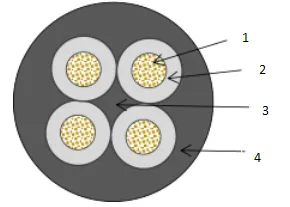Nov . 20, 2024 01:07 Back to list
stainless steel ball valve
Stainless Steel Ball Valves An Essential Component in Fluid Control
Stainless steel ball valves are an essential fixture in various industries that require reliable and efficient fluid control. These valves are widely recognized for their durability, versatility, and ease of operation, making them a popular choice in applications that range from water supply systems to high-pressure gas management. This article will explore the features, benefits, and applications of stainless steel ball valves.
Construction and Functionality
A stainless steel ball valve consists of a hollow, perforated, and pivoting ball that controls the flow of liquid or gas through the valve. The valve remains open when the ball’s hole aligns with the flow, and closed when it is perpendicular to the flow. The use of stainless steel gives these valves significant advantages, primarily due to its resistance to corrosion and high temperatures. Unlike other materials, stainless steel can handle a wide range of environmental conditions without compromising the integrity of the valve.
The design of a ball valve ensures minimal pressure drop and allows for a full flow when opened, which contributes to its efficiency. Furthermore, the quarter-turn operation means that these valves can be opened or closed quickly, providing excellent control over flow rates.
Advantages of Stainless Steel Ball Valves
One primary advantage of stainless steel ball valves is their durability. Stainless steel is known for its mechanical strength and resistance to wear and tear, making these valves suitable for demanding environments. They are also easy to maintain, with no special tools required for their operation or servicing.
Another significant benefit is their versatility. Stainless steel ball valves can be used in numerous applications, including water treatment plants, oil and gas industries, food processing, and pharmaceuticals, among others. Their ability to handle various types of fluids, whether corrosive or non-corrosive, makes them invaluable in many settings.
stainless steel ball valve

Moreover, ball valves offer excellent sealing capabilities. When closed, the ball fits snugly against the valve seat, which significantly minimizes the risk of leaks. This is particularly crucial in applications where leakage could result in hazardous situations or potential losses.
Applications and Industries
Stainless steel ball valves find application across diverse sectors. In the food and beverage industry, for instance, they are used to control the flow of ingredients and beverages due to their ability to maintain hygiene and withstand cleaning processes. Their non-reactive nature ensures that they do not introduce any contaminants into the fluid being processed.
In the oil and gas sector, stainless steel ball valves are utilized to manage the flow of oil, gas, and other fluids, often in high-pressure environments. Their robustness and reliability are vital for maintaining operational safety and efficiency.
Furthermore, stainless steel ball valves are increasingly used in commercial and residential plumbing systems for water supply and heating applications. Their easy installation and low maintenance costs make them a preferred choice for contractors and homeowners alike.
Conclusion
In summary, stainless steel ball valves are a critical component in fluid control systems across various industries. Their durability, efficiency, and versatility make them ideal for applications ranging from food processing to high-pressure gas management. The choice of stainless steel as a construction material not only enhances their lifespan but also ensures they can handle diverse and demanding conditions. As industries continue to prioritize safety and efficiency, the role of stainless steel ball valves will undoubtedly remain prominent.
Share
-
Reliable Wafer Type Butterfly Valves for Every IndustryNewsJul.25,2025
-
Reliable Flow Control Begins with the Right Ball Check ValveNewsJul.25,2025
-
Precision Flow Control Starts with Quality ValvesNewsJul.25,2025
-
Industrial Flow Control ReliabilityNewsJul.25,2025
-
Engineered for Efficiency Gate Valves That Power Industrial PerformanceNewsJul.25,2025
-
Empowering Infrastructure Through Quality ManufacturingNewsJul.25,2025